Sihtasutus Junior Achievement Eesti
Country: EE
Partner budget: 520.332 EUR
Amount of ERDF funding: 442.283 EUR ERDF
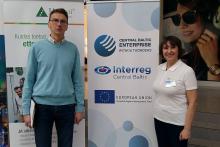
P1 Competitive economy
1.2. More entrepreneunial youth
Central Baltic
01.09.2015 - 30.04.2019
1.726.220 EUR
1.379.481 EUR ERDF
The objective of the CBEwB project is to have more entrepreneurial youth in the Central Baltic region. Until now the focus has been on local entrepreneurship education and it has been a challenge to support international activities. In the CBEwB project students take initiative in creating international student companies with students from other Central Baltic countries. Students meet, develop ideas, create and manage their companies and sell products together.
The project starts with a seminar where students get acquainted, find a common business idea and create the first EwB’s. The student company partners work closely together and visit trade fairs to sell their products. The companies are closed down in a year followed by an analysis of the used methods and their outcomes, leading to further developing the model. The project activities include training also for teachers and business mentors as well as producing learning materials.
During the project at least 50 international student companies are created. Altogether this will result in better teachers and more young people with CB networks and competence in international business. At least 300 students, 80 teachers and 50 mentors participate in the project.
Country: EE
Partner budget: 520.332 EUR
Amount of ERDF funding: 442.283 EUR ERDF
Country: LV
Partner budget: 327.830 EUR
Amount of ERDF funding: 278.656 EUR ERDF
Country: FI
Partner budget: 447.714 EUR
Amount of ERDF funding: 335.786 EUR ERDF
Country: SE
Partner budget: 430.344 EUR
Amount of ERDF funding: 322.758 EUR ERDF
For contributing to more entrepreneurial central Baltic youth, the Junior Achievement (JA) organisations from Estonia, Latvia, Sweden and Finland joined forces to create joint student companies (business simulations) across borders. The project activities took place during 3 school years, totaling 78 joint student companies with 480 participants from 55 schools.
Learning materials were developed for entrepreneurship education in all four countries and teachers were trained for moderating and consulting student companies at schools. During three years a well functioning model of forming and managing international business simulations was developed. At the end of the project a Teachers Guide was published online for making the process of student joint companies sustainable. This guide was published first in English and then translated to all four languages. It was made available for all teachers in participating countries but also shared with all countries in the network of Junior Achievement Europe, the organization of 42 countries. All JA organisations became experts in this field which is a valuable resource of knowledge for this region but also for the whole Europe.
Three kick-off conferences were organised, followed by three innovation camps. Every year CBEwB students participated together in four student company trade fairs in all countries.
Teachers got teacher training combined with kick-off conferences, innovation camps and trade fairs in Latvia and Sweden. Final student conference and teachers conference were organised each spring.
Seekordne õpilasfirmade laat purustas rekordeid
Õpilasfirmade veebipood plaanib laieneda Põhjamaadesse ja Lätti
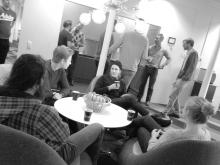
P1 Competitive economy
1.1. New Central Baltic knowledge intensive companies
Central Baltic
01.10.2015 - 30.09.2018
1.101.851 EUR
843.907 EUR ERDF
The BELT project creates new joint Central Baltic companies and cooperation between start-ups in the Central Baltic region. The project develops joint and cooperating business opportunities under the theme of “Smart City”, which is a priority at the EU-level and many regional innovation policies to support cross-sectoral smart innovations.
BELT strives to attract entrepreneurship-oriented, already experienced and talented students as well as potential start-ups to the project incubator activities through relevant networks, platforms and university road shows in the partner locations. BELT organizes joint business development BootCamps and coaching for students and start-ups to develop and commercialize their business ideas and to look for additional team members across borders. Additionally, a coaching network will be created to offer business coaching for the established joint teams and best co-operating business ideas from the BootCamps to help them find seed funding for their businesses.
The project will result in at least 5 joint and 10 co-operating knowledge intensive enterprises. The project will support 30 new knowledge intensive enterprises in the Central Baltic region.
Country: FI
Partner budget: 224.085 EUR
Amount of ERDF funding: 168.064 EUR ERDF
Country: FI
Partner budget: 272.000 EUR
Amount of ERDF funding: 204.000 EUR ERDF
Country: SE
www.nosp.se, eastsweden.demola.net
Partner budget: 24.802 EUR
Amount of ERDF funding: 18.602 EUR ERDF
Country: LV
http://www.itbaltic.com, http://latvia.demola.net/
Partner budget: 4.574 EUR
Amount of ERDF funding: 3.888 EUR ERDF
Country: FI
Partner budget: 220.200 EUR
Amount of ERDF funding: 165.150 EUR ERDF
Country: LV
Partner budget: 16.870 EUR
Amount of ERDF funding: 14.340 EUR ERDF
Country: SE
http://www.almi.se/English/, http://eastsweden.demola.net/
Partner budget: 185.576 EUR
Amount of ERDF funding: 139.182 EUR ERDF
Country: LV
Partner budget: 153.743 EUR
Amount of ERDF funding: 130.681 EUR ERDF
Country: FI
Country: FI
Country: LV
The BELT project improved start-up culture within the Central Baltic region in various ways. For instance, four BootCamps were organised under the Smart City theme in Jurmala, Helsinki, Norrköping and Tampere. In total, 86 start-ups or teams participated in them, along with individual business ideas.
Although no international joint companies were created, one regional start-up was born with the help of the project. Co-operation between start-ups was active with 15 projects partaking. Co-operation took place e.g. through utilising contacts from other start-ups, gaining information about regional markets and exchanging feedback with each other.
BELT coaches and mentors gave many consultations and during the project, a network of coaches, start-ups and teams was established.
Project targeted to support 30 new enterprises and 30 existing enterprises. The target was reached and support was given altogether for 47 new enterprises and 47 existing enterprises.
Findings and best practices from the BELT project mare gathered into a Coaching Manual.
P3 Well-connected region
3.1. Improved transport flows of people and goods
Southern Finland - Estonia
01.09.2015 - 30.11.2017
1.973.205 EUR
1.627.224 EUR ERDF
The project MobiCarnet aims at improving the transport flows of goods and reducing the time-consumption of the movement of goods in three strategic transport corridors between Estonia and Finland. The idea is to enable an integrated system for automated and paperless management of transit documents and for tracking movement of goods in real-time. Currently there is no united and integrated system that enables to manage the transport related information and documentation across borders electronically, which makes the transportation of goods time consuming and ineffective.
In practice the project helps to harmonize transport procedures by enabling real-time overview of trucks and goods movement for all authorised organisations involved and preventing duplication and double checking of data. The MobiCarnet system will be first implemented within the three corridors in the region of Estonia and Finland. After the project, both partners are responsible for improving the system further according to the needs and possible changes in the regulations of the country.
As a result of the project the transport flows of goods improve and time-consumption of the movement of goods reduces in three strategic transport corridors (Ikla-Kotka, Ikla-Kemi and Luhamaa-Turku). The project reduces transportation time of goods in three transport corridors by more than 13%. The project is implemented in close partnership with the Association of Estonian International Road Carriers and Finnish Transport and Logistics SKAL. All in all, the project identifies and targets the challenges related to the improvement of the transport corridors within the Central Baltic region.
Country: EE
Partner budget: 1.473.205 EUR
Amount of ERDF funding: 1.252.224 EUR ERDF
Country: FI
Partner budget: 500.000 EUR
Amount of ERDF funding: 375.000 EUR ERDF
Country: EE
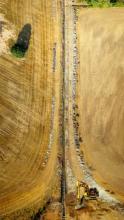
P2 Sustainable use of common resources
2.4. Reduced nutrients, hazardous substances and toxins inflow into the Baltic Sea
Central Baltic
01.09.2015 - 28.02.2019
1.763.962 EUR
1.389.058 EUR ERDF
The project NUTRINFLOW aims at reducing nutrient losses from agriculture to the immediate watershed and into the Baltic Sea. The idea is to take practical actions for holistic drainage management for reduced nutrient inflow to the sea. This is done by implementing, demonstrating and increasing the recognition of innovative water management measures in agricultural areas.
The project activities focus on pilot areas in Finland, Latvia and Sweden under pressure by agricultural nutrient losses. The project implements targeted demonstration investments to the fields and to the drainage network in cooperation with municipalities and farmers as the main target groups. Through the investments, the project expects to reduce nutrient losses from agriculture in three priority regions.
As a result of the project, the nutrient inputs to the Baltic Sea is decreased whereas the attractiveness and feasibility of holistic water management approach for agricultural catchments across the Central Baltic Region is increased. All in all, the project connects local authorities and farmers in a unique way and demonstrates a cross-sector approach in sustainable agriculture and management of ecosystem resources. The project is the first full-scale project under the EU Strategy for the Baltic Sea Region flagship project “Flow Baltic” through which it will gain region-wide visibility.
Country: FI
http://etela-suomi.proagria.fi/
Partner budget: 579.988 EUR
Amount of ERDF funding: 434.991 EUR ERDF
Country: LV
Partner budget: 247.391 EUR
Amount of ERDF funding: 210.282 EUR ERDF
Country: LV
Partner budget: 171.626 EUR
Amount of ERDF funding: 145.882 EUR ERDF
Country: LV
Partner budget: 102.020 EUR
Amount of ERDF funding: 86.717 EUR ERDF
Country: SE
Partner budget: 251.048 EUR
Amount of ERDF funding: 188.286 EUR ERDF
Country: SE
www.lansstyrelsen.se/ostergotland
Partner budget: 190.803 EUR
Amount of ERDF funding: 143.102 EUR ERDF
Country: FI
Partner budget: 56.588 EUR
Amount of ERDF funding: 42.441 EUR ERDF
Country: FI
Partner budget: 24.666 EUR
Amount of ERDF funding: 18.500 EUR ERDF
Country: LV
Partner budget: 139.833 EUR
Amount of ERDF funding: 118.858 EUR ERDF
Country: SE
NUTRINFLOW reduced nutrient losses from agriculture to immediate watersheds and into the Baltic Sea. Reduction was achieved through pilot investments implemented in Finland, Sweden and Latvia, where various nutrient sources were targeted. Instead of the planned five nutrient sources, the project ended up choosing 11 sources. Actions included river channel restorations, building wetlands and flood plains, mounting or renovating culverts and improving subsurface drainage. Direct improvements from these actions were reduced nutrient losses in phosphorus and nitrogen.
Knowledge gained from the pilot sites serve as a reference for a holisitic drainage management, offering farmers and other stake-holder organisations important information on these issues. The project also increased general awareness among farmers, advisors and municipal authorities and services on drainage techniques and approaches to integrate field and basic drainage measures. Due to its high relevance, good implementation and re-usability of results, the project gained the Baltic Sea Strategy Flagship (Flow Baltic) status. The outcomes of the NUTRINFLOW will be further utilised by the Ministry of Agriculture to prepare suggestions on nutrient retention measures in agricultural drainage to be supported in Latvia during the next planning period of the Common Agricultural Policy (2021-2027).
Project website: nutrinflow.eu
• Reduced nutrients from agriculture to immediate water-sheds and into the Baltic Sea
• Five pilot sites with good experiences
• EUSBSR flagship project
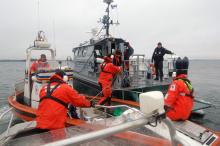
P3 Well-connected region
3.2. Improved services of existing small ports to improve local and regional mobility and contribute to tourism development
Archipelago and Islands
01.10.2015 - 31.03.2018
1.178.136 EUR
953.597 EUR ERDF
The project MASAPO aims at developing maritime safety in small ports in the Baltic Sea Region. The project tackles the lack of information about small ports and safety services in Estonia and Åland. The project develops cooperation between small ports in Estonia and Åland islands to provide better information about the ports and their safety services. The project involves pilot voluntary maritime rescue organisations to use their international experience in developing and implementing higher safety standards in the ports for tourists and local habitants.
In practice the project jointly surveys and maps the current safety situation in the participating small ports and makes development plans for the needed investments. The project does research and trains volunteers and local service providers in the pilot ports to have the necessary skills for preventive activities and for participation in rescue operations.
As a result of the project the pilot small ports in Estonian and Åland islands have tight cooperation with four local voluntary maritime rescue organisations like members of Estonian Voluntary Maritime Rescue Organisation and stations of Åland island Lifeboat Society. Partners have jointly designed a basic safety quality sign and the safety services have been improved. Through these improvements the number of visitors on the islands is expected to increase as higher safety standards improve reliability and attract more visitors to the region.
Country: EE
Partner budget: 699.952 EUR
Amount of ERDF funding: 594.959 EUR ERDF
Country: FI
Partner budget: 478.184 EUR
Amount of ERDF funding: 358.638 EUR ERDF
MASAPO raised maritime safety in coastal areas and small ports. The targeted areas include western Estonia and the Åland archipelago. Increased maritime safety was achieved through training and increased capacity of voluntary maritime rescue organisations. Additionally, infrastructure development took place and rescue equipment (rescue boats, personal safety equipment and so on) was purchased in selected small ports.
The trainings and rescue exercises were organised together by project partners. The infrastructure development and purchases supported the training and helped achieve long-term commitment to be part of voluntary marine rescue.
In total, conditions, rescue capacity and service level was improved in eight small ports on Estonian islands (Kõrgessaare, Kärdla, Lõunaranna, Kuressaare, Soela, Suaru ) and on Åland islands (Rödhamn, Kasterholm).
To make the developed small ports more accessible, the project published an application that allows to ‘View your marinas of interest virtually in beautiful 360°-panoramas’. The app is available in Google Play Store.
Vabatahtlike uhiuus paat tuhiseb mööda vett kui tuul (2018)
Rödhamn fick vattenledning (2017)
Suurim õnnestumine oli inimelu päästmine (2017)
Sjöräddningen döpte nytillskott i stor stil (2017)
Kommunalt vatten till Rödhamn (2017)
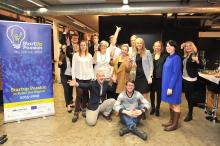
P1 Competitive economy
1.1. New Central Baltic knowledge intensive companies
Central Baltic
01.09.2015 - 31.08.2019
1.761.262 EUR
1.392.073 EUR ERDF
While it is widely acknowledged that an entrepreneurial career path is a viable avenue for employment in the times of economic restructuring, many Central Baltic regions have limited resources and knowhow to support the creation of cross-border companies. The project STARPABS aims at raising awareness and interest towards entrepreneurship among university students and helping them to build international teams around their business ideas. The project will also attract new entrepreneurial talent into the Central Baltic region as well as create a model for supporting creation of student-based international companies.
The project combines competences of higher education programmes, student populations and enterprise development agencies to encourage the best students to take up international entrepreneurship. This is done by organising e.g. Massive Open Online Courses (MOOC) of entrepreneurship, hackathons and business idea development workshops for students. The training process is based on proven business development models and tools including a business idea competition.
By the end of the project 10-15 new knowledge intensive cross-border companies and 5-6 cooperation agreements have been established. Additionally, wide idea of a student-based entrepreneurial ecosystem is disseminated and a competence and network model is created for supporting the creation and growth of knowledge-intensive cross-border companies in cooperation with universities, enterprise development agencies and private actors.
Country: FI
Partner budget: 510.000 EUR
Amount of ERDF funding: 382.500 EUR ERDF
Country: EE
Partner budget: 412.982 EUR
Amount of ERDF funding: 351.035 EUR ERDF
Country: FI
Partner budget: 540.000 EUR
Amount of ERDF funding: 405.000 EUR ERDF
Country: LV
Partner budget: 298.280 EUR
Amount of ERDF funding: 253.538 EUR ERDF
The overall aim for the project “Start-up Passion in Baltic Sea Region” (STARPABS) was to raise interest towards entrepreneurship among university students, and help them to build internationally competitive teams. Three universities from the countries Finland, Estonia and Latvia participated.
The main objective was to create student-based knowledge intensive cross-border companies and cooperation agreements.
The project organized 18 events. In total about 800 participants were involved in the project activities. From initially 50-60 teams formed, 23 teams became operational, out of which 16 companies were registered, and 2 of them are joint cross-border companies. The established companies have prepared export and expansion plans for the next few years.
After the project had ended, some of the teams were currently working on the development of their business idea, and some of them were in the seed funding stage. Other teams were “on hold” until graduation and planned to continue afterwards.
Furthermore, the aim was to create a cross-border model to support start-ups in the Central Baltic region, and to enhance the attractiveness of CB region as a start-up platform for entrepreneurial talents. This was also achieved in the project. The training program “6-step to success” will continue in the form of our MOOC (“Massive Open Online Courses” consisting of hackathons and business idea development workshops for students), which can be used by new start-up teams after the end of the project.
Baltikumi idufirmad pandi filmi sisse. Äripäeva raadio intervjuu projektijuht Olesja Rotariga.
Päästa planeet läbi rohelise energiasüsteemi? … käkitegu!
В Эстонии сняли сериал о стартапах
Neveli Niit: «Start-up’i tehes langetad karme valikuid»
Neveli Niit – tavalisest loomeinimesest inspireerivaks ettevõtjaks

P4 Skilled and socially inclusive region
4.1. More people benefiting from stronger Central Baltic communities
Central Baltic
01.04.2016 - 31.03.2018
261.460 EUR
207.757 EUR ERDF
EmpowerKids addresses social exclusion and inadequate health information and social advice among the children in low-income families in Estonia, Finland and Latvia. Currently, health and social workers lack methods and approaches for promoting daily healthy choices for young children in families with low socio-economic status. There is need for more appealing methods to improve the situation in vulnerable families, which can be found in cooperation between the cities and universities.
Traditionally, low income families and young children are considered a difficult target group to be reached with the health information, even if they need support the most. Research confirms that socioeconomic status of the family is directly correlated with the experienced health of its members, as well as with social inclusion and participation in the labour market. People with lower education and income experience poorer health, their social participation is lower, and they are more often excluded from the labour market. Their children’s health, social inclusion and future socioeconomic prospects are strongly affected.
To improve matters, the project will be working with an interview-based interactive tool that facilitates health and social advices for children and their families. The EmpowerKids Tool, developed by all partners with the methodological support of University of Turku, will utilize targeted counselling and interventions, according to the real needs. The cross-border cooperation will allow partners to learn from each other, share experiences and support each other with their specific expertise.
The project results will be widely distributed through the existing and developing networks in Central Baltic and beyond. The results include children who are able to make healthy choices in their daily lives, improved quality of health promotion, social work in participating municipalities, enhanced social inclusion of children from vulnerable groups, increased knowledge of health care personnel, social workers and kindergarten teachers about the empowering tools and methods.
Country: FI
Partner budget: 81.905 EUR
Amount of ERDF funding: 61.429 EUR ERDF
Country: FI
Partner budget: 62.931 EUR
Amount of ERDF funding: 47.198 EUR ERDF
Country: EE
Partner budget: 59.008 EUR
Amount of ERDF funding: 50.157 EUR ERDF
Country: LV
Partner budget: 0 EUR
Amount of ERDF funding: 0 EUR ERDF
Country: LV
Partner budget: 57.616 EUR
Amount of ERDF funding: 48.974 EUR ERDF
EmpowerKids developed an Internet-accessible tool that promotes healthy living habits and well-being to small children. The tool was developed in close cooperation with health care workers, social care workers and children. The aim of the tool is to supports professionals in consultations regarding physical activity, nutrition, family resources and daily activities, by providing children an easily-approachable and attractive way to receive and reflect on such information.
In addition, the project organised workshops for children and their parents. Topics included healthy eating, sandplay therapy sessions, physical activities and good sleeping habits.
Experiences gained from using the tool and the workshops were gathered into a collection of good practices.
Altogether, 628 children participated in project activities. Approximately 300 of the participating children came from low-in-come families and thus the target of 180 was exceeded. In total, 45 health care and social workers participated in the project, topping the goal of 30.
News.lv Newspaper of Jurmala 21.09.2017
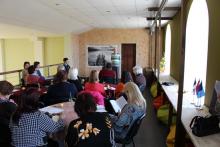
P4 Skilled and socially inclusive region
4.1. More people benefiting from stronger Central Baltic communities
Central Baltic
01.03.2016 - 28.02.2018
197.552 EUR
167.919 EUR ERDF
The common challenge of the Setomaa region in Estonia and the Engure and Ape regions in Latvia is to improve the social well-being of long-term unemployed local seniors.
Decreasing population in rural areas is affecting negatively the local labor market. It’s critical that older generations stay economically active for longer. Currently 950 people belonging to the working age population in Setomaa, Ape and Engure regions have not worked in over a year. Many of them are older than 55 and have a weaker position in the labor market due to their age.
To tackle this problem, partners located in Estonia and Latvia decided to join their efforts, to develop a joint approach/action plan based on the real needs of unemployed seniors from cross-border areas.
The aim of the project is to create better possibilities to access the local labor market for long-term unemployed seniors aged 55+ from Setomaa, Engure and Ape regions. The objective will be achieved through the implementation of training activities for ca 100 unemployed seniors.
Participants will improve their skills and knowledge according to the real needs of local public and private sector. People with lower motivation and self-confidence will be both mentored and encouraged to participate in support groups.
In this context a People-to-people approach will be used, thus enabling seniors from 3 regions to meet and interact with each other, to learn from each other’s experiences and to develop ideas for the future.
Local municipalities play a key role in this process; they have identified a large group of people aged 55+ with low or no income, but having potential for participation in the local labor market.
Country: EE
Partner budget: 95.219 EUR
Amount of ERDF funding: 80.936 EUR ERDF
Country: LV
Partner budget: 52.151 EUR
Amount of ERDF funding: 44.328 EUR ERDF
Country: LV
Partner budget: 50.182 EUR
Amount of ERDF funding: 42.655 EUR ERDF
The main result of the project - social well-being of local people aged 55+ has been improved through higher employment and incomes. Participants of the project gained practical skills, knowledge, self-esteem, self-confidence. Motivation of seniors have improved and they have better access to local labor market now, some seniors have already found a new job.
More than 400 members of the target group participated in the project activities and got both practical skills and encouragement. The interest towards project activities was big in the target group and the planned target value of 100 participants was exceeded a lot. Practical and theoretical trainings such as handicraft, English and computer courses were appreciated by all participants. Especially for seniors who have been unemployed for a long period of time and needed more personal approach and support because of low self-confidence, support of the group and mentoring to improve the participants’ self-esteem were important. Joint study tours and visits were organised to strengthen the cross-boarder network and to share good ideas and experiences.
Through the networking and people-to-people communication seniors received new ideas which can be used in making better choices and improving their social well-being in the future. Participants plan to use their new skills to find a job, earn additional income or create new activities as NGO or self-employed person. Other organisations in CB area can use the results of the survey to develop integration measures for similar target groups.
apesnovads.lv - project homepage of Latvian partner Ape Municipality (LAT)
enguresnovads.lv - project homepage of Latvian partner Engure Municipality (LAT)
apesnovads.lv - project news (LAT)
apesnovads.lv - project news (LAT)
https://setomaa.postimees.ee - project news (EST)
www.gravitas.ee - project news (EST)
www.laukutikls.lv - article (LAT)
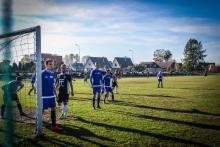
P4 Skilled and socially inclusive region
4.1. More people benefiting from stronger Central Baltic communities
Southern Finland - Estonia
01.02.2016 - 31.01.2018
255.906 EUR
209.995 EUR ERDF
The Central Baltic economies are experiencing high youth unemployment rates; it’s a challenge for young graduates to enter the labor market. The main obstacle is not so much identifiable with lack of education rather with lack of experience. One opportunity to receive work experience is to do voluntary work.
According to a LinkedIn research, 41% of managers hiring through LinkedIn consider volunteer work as equally valuable as paid work experience when evaluating candidates. In the EU, volunteer activities related to sport attract 20 million people.
Currently, in the CB region, access to volunteering opportunities is dispersive: young people could more effectively and systematically provide their contribution as sports volunteers if information concerning different opportunities for volunteering were more easily available.
The aim of this project is to increase young people opportunities to access the labor market, by developing and piloting a cross-border sport volunteering model in Southern-Finland and Estonia through the following activities:
1) Development of a cross-border sport volunteering model that will be tested by 500 young unemployed during different sport events in Estonia and Southern-Finland; 2) Development and pilot of an innovative ICT-based platform to unite sport volunteers and promote sport volunteering opportunities in Southern-Finland and Estonia; 3) Set up a promotion campaign and awareness-raising seminars at vocational schools/universities. Organize a large-scale conference (forum) to promote sport volunteering possibilities as a labor-market advantage for young unemployed.
Country: EE
Partner budget: 180.650 EUR
Amount of ERDF funding: 153.553 EUR ERDF
Country: FI
Partner budget: 75.256 EUR
Amount of ERDF funding: 56.442 EUR ERDF
To improve possibilities for young people to enter the labour market, YOUTH-SPORT-VOL implemented a sport volunteering model. The model allows young adults to gain working knowledge in the framework of volunteering, thus improving their possiblities to find work. To make volunteering easily discoverable, the project created a web service that allows browsing of events and registering as a volunteer in them. A permanent secreatariat for sport volunteering was established at the Tallinn University as well. The project engaged with 985 unemployed young adults, nearly twice as many as planned.
P4 Skilled and socially inclusive region
4.1. More people benefiting from stronger Central Baltic communities
Southern Finland - Estonia
01.04.2016 - 31.05.2018
174.297 EUR
140.458 EUR ERDF
The main objective of the CROSS project is to support the integration of unemployed immigrants who have lived in Estonia 5 years or longer, including second-generation immigrants, and Estonian immigrants living in Finland, as well as to involve Estonian and Finnish organisations that are ready to hire people from different national backgrounds.
Project activities are developed and carried out in close cross-border cooperation. Both in Estonia and Finland up-to-date understanding of immigrants’ integration needs and requirements is essential. The Finnish partner will share best practices on mentoring immigrants and the Estonian partner will provide expertise in developing a peer support that suits specifically Estonians living in Finland.
Diversity-based activities will be carried out for organisations in Estonia and Finland. With the help of these activities, the organisers aim to raise awareness of multicultural working environments, thereby leading to an increase in the willingness of organisations to recruit people of different nationalities.
Country: EE
Partner budget: 97.349 EUR
Amount of ERDF funding: 82.746 EUR ERDF
Country: FI
integration.luckan.fi, luckan.fi
Partner budget: 76.949 EUR
Amount of ERDF funding: 57.711 EUR ERDF
Project CROSS focused on the integration of the Russian community in the Ida-Virumaa region in Estonia and that of the Estonian community in the Helsinki region in Finland.
The project targeted unemployed members of these communities.
The project implemeted a mentor as well as a diversity management programme. Both programmes aimed at the integration of the target communities. Altogether the project involved 86 people including mentors and mentees.
P4 Skilled and socially inclusive region
4.1. More people benefiting from stronger Central Baltic communities
Southern Finland - Estonia
01.04.2016 - 31.03.2018
210.145 EUR
166.205 EUR ERDF
This project identifies the main challenges Estonian women who have immigrated to Finland have to face; compared to local residents they are socially and economically more vulnerable and face more problems often difficult to foresee. So far the issue has not been dealt with a systematic approach.
The project will set up peer group sessions in Finland and Estonia using the Peer Counselling technique. The aim is to strengthen the sense of community in the target group and to enable the members to communicate and share their experiences. A future framework will also be established to enable a discussion on common issues and problems.
Project activities include a collection of data, the establishment of three peer groups of Estonian female immigrants in Turku, Helsinki and Tallinn, the organisation of peer group events throughout the project period, the establishment of walk-in info points in Turku and Helsinki, communication activities including a Facebook community and a project webpage. The Turku and Helsinki regions were selected due to the density of Estonian population and because they host operational partner organisations working with Estonians.
Country: EE
the lead partner does not have a home page
Partner budget: 85.960 EUR
Amount of ERDF funding: 73.066 EUR ERDF
Country: FI
Partner budget: 70.360 EUR
Amount of ERDF funding: 52.770 EUR ERDF
Country: FI
Partner budget: 53.825 EUR
Amount of ERDF funding: 40.369 EUR ERDF
Compared to local residents, foreigners encounter bigger challenges to enter the labour market. FEM project focused on offering support to Estonian women moving to Finland.
To enable smoother access into the Finnish labour market, both for the Estonian women planning to move to Finland and for those already living in the country, the project established info points ”infotuba” in Turku and Helsinki and peer support groups as well as several information events both in Finland and Estonia. The events covered issues such as:
• economic coping
• children and education
• language, language barriers, and culture
• local people's attitudes, stereotypes
• labour market
Altogether 165 people visited or contacted the info points and 260 people participated in information activities.

P4 Skilled and socially inclusive region
4.2. More aligned vocational education and training (VET) programmes in the Central Baltic region
Central Baltic
01.03.2016 - 28.02.2018
187.901 EUR
148.139 EUR ERDF
Many children living in vulnerable living environments in families and/or in residential child care settings are often in need of psychiatric treatment as well as child protection services. The demand for a closer collaboration between child protection services and mental health services is high, but the frameworks available at the moment are not sufficient to guarantee suitable outcomes for vulnerable children.
The problem is that professionals act in separate sectors and thus effective inter-professional networking is difficult to establish. Moreover, each care profession has a different working culture, values and behaviors.
A promising method to help children and adolescents is the acute team work model. The approach is fairly new in youth psychiatric services in Finland and not existing in Estonia.
ACUCARE´s objective is to develop vocational e-course trainings for nursing-, social work and social educator students to create more aligned joint VET programs among partner countries.
The e-course is meant for inter-professional psychiatric acute team work and is divided into two parts: family work in open care (5 ECTS) and residential child care in foster care (5 ECTS).
The project aims at developing new professional skills and innovative ways of working. The e-course increases collaboration between students and practitioners working on different systems and in different countries.
Country: FI
Partner budget: 115.765 EUR
Amount of ERDF funding: 86.824 EUR ERDF
Country: EE
Partner budget: 50.494 EUR
Amount of ERDF funding: 42.920 EUR ERDF
Country: EE
http://www.nooruse.ee/est/esileht/
Partner budget: 21.642 EUR
Amount of ERDF funding: 18.396 EUR ERDF
Country: FI
Country: EE
Country: EE
Country: FI
Many children in vulnerable living environments need psychiatric treatment as well as child protection services. The demand for a closer collaboration between different services is high, but professionals act in separate sectors and thus effective inter-professional networking is difficult to establish.
The ACUCARE partnership considered it beneficial for specialists to learn from each other by using the acute teamwork model to help children and adolescents. The project developed vocational e-course trainings for nursing-, social work and social educator students - a new model of interprofessional psychiatric acute teamwork.
The project mapped and reported the needs for interprofessional training and created the e-learning platforms. The training modules were developed in English and translated into Finnish and Estonian. The project’s main result was the new 10 (5+5) ECTS interprofessional vocational training e-course, including e-learning materials and an e-curriculum manual for the use of different vocational education training organisations.
The e-course consists of two themes:
A literature review about mental health care interventions in child welfare was submitted for wider international readership. Three scientific articles were planned, but the target was too ambitious. One article was published.
National implementing the project results was well done by all partners. It was somewhat challenging in Estonia to find relevant training programmes where the developed modules can be integrated, as the childcare responsibilities are divided differently between organisations in Estonia and Finland. The project accomplished a certain familiarity and understanding of different child protection systems and professional cultures in the partner countries.
Another objective was to increase mobility and job satisfaction of social and health care workforce and integration of Central Baltic labour market. The possibilities were discussed, and there are lots of similarities, but also differences in professionals’ attitudes to family and its rights and the concept of ‘family’ in Estonia and Finland. It is beneficial for specialists to share experiences and for students to learn about other profession´s competencies.
The project used modern information and communication technologies for its work and produced e-learning materials. Project successfully communicated its achievements via presentations in international conferences and by organising seminars for the stakeholders.
ACUCARE Project’s final seminar 2.11.2017 focused on promising interprofessional collaboration practices in psychiatric and child protection sectors in Finland and Estonia.
One course in Estonian can be find here.